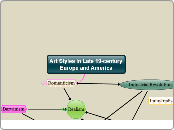Art Styles in Late 19-century Europe and America
"Celebrates the individual subject and the subjective" (Stokstad, 915)
Stokstad, Marilyn. Art History, Volume Two, Fourth Edition. Pearson, 2011. (pps. 915, 1001).
Objective descritions of the ordinary
Often rejected as unacceptable work
Industrialization and Urbanization
Loose, "unfinished brushstrokes
Scientific emphasis on optical properties of light and color
Developed as a result of boycotting the Académie des Beaux-Arts
"Fascination with the dark recesses of the mind" (Stokstad, 1001)
Artists address irrational fears, desires, and impulses of the human mind (Stokstad, 1001)
with the invention of the camera, it was easy to see the current working and living conditions of the factory workers
These conditions led to many social revolutions
Post-Impressionist artists did not share a unified style or approach to their art work
Impressionism and modernity used as starter for individual expression
